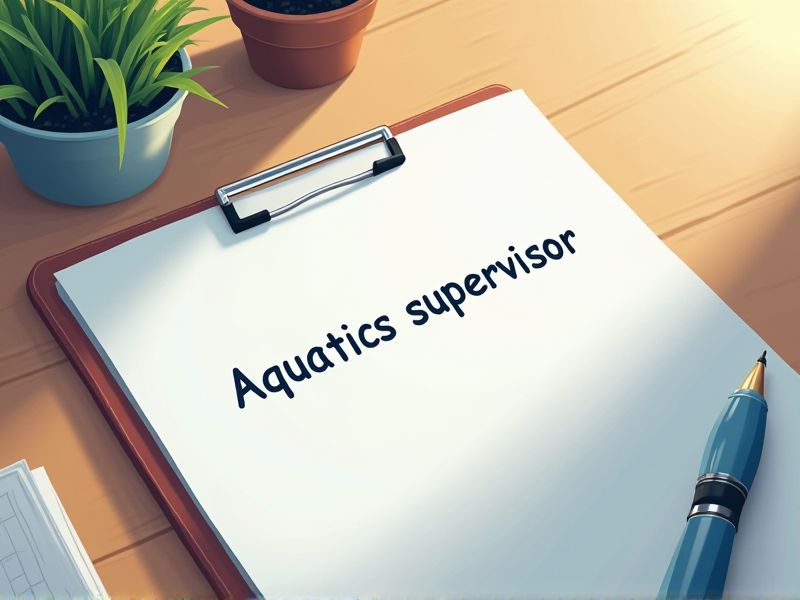
An Aquatics Supervisor plays a crucial role in ensuring the safety and effective management of aquatic facilities. Certifications provide validation of skills required to prevent accidents and emergencies in high-risk water environments. They also demonstrate the supervisor's ability to train and lead a team of lifeguards effectively. Here is a list of important certifications you may need as an Aquatics Supervisor.
American Red Cross Lifeguarding Certification
Aquatics supervisors often manage lifeguard staff and operations, making it crucial for them to have in-depth understanding of the protocols and safety measures covered in the American Red Cross Lifeguarding Certification. This certification ensures they possess the knowledge to effectively evaluate and promote water safety practices. Understanding emergency response procedures as outlined in the certification allows supervisors to act decisively in critical situations. Certification fosters credibility and assurance among team members and patrons, enhancing overall trust in facility management.
American Red Cross CPR/AED Certification
Possessing an American Red Cross CPR/AED Certification ensures that an Aquatics supervisor is equipped to respond effectively to emergencies, potentially saving lives. The certification validates skills in automated external defibrillator usage, critical for managing sudden cardiac events in aquatic settings. As a recognized standard, it offers credibility and assures parents and facility users of professional competence in safety protocols. Regulatory bodies often mandate such certifications, aligning with industry standards for operational safety in aquatic environments.
American Red Cross First Aid Certification
American Red Cross First Aid Certification provides aquatics supervisors with essential skills to manage and respond to medical emergencies effectively, ensuring swimmer safety. Having this certification is often a legal requirement, as it demonstrates compliance with local and state regulations for aquatic facility management. Trained supervisors are more equipped to reduce the risk of liability by offering trained, immediate care, minimizing severity of poolside incidents. The certification fosters public trust, as patrons feel more secure knowing there is a qualified individual overseeing safety protocols.
Water Safety Instructor Certification
Aquatics supervisors require Water Safety Instructor Certification to ensure they possess comprehensive knowledge of essential water safety practices, which helps prevent accidents. Certification confirms the instructor's ability to teach approved swimming and water safety courses, a fundamental part of supervising aquatic facilities. By maintaining certified staff, facilities demonstrate commitment to safety standards, reducing liability risks. This credential enables supervisors to train other staff effectively, ensuring a consistently safe environment for all patrons.
APO Certified Pool Operator Certification
APO Certified Pool Operator Certification ensures compliance with health and safety regulations in aquatic facilities. It provides aquatics supervisors with the knowledge to properly maintain pool water quality, reducing the risk of illness among facility users. Certified personnel are trained to efficiently manage the mechanical and chemical aspects of pool operations, promoting a safe swimming environment. This certification is often a prerequisite for various job roles, which can enhance employment opportunities and career advancement for aquatics supervisors.
Aquatic Facility Operator Certification
Aquatic Facility Operator Certification provides essential knowledge in water chemistry and facility management, crucial for maintaining safe swimming conditions. Understanding regulatory standards through certification helps supervisors ensure compliance with health and safety laws. The certification enhances risk management skills, reducing the likelihood of accidents and liabilities. Employers often require certified operators to demonstrate a commitment to high operational standards and public safety.
Lifeguard Management Certification
Lifeguard Management Certification equips aquatic supervisors with skills to effectively oversee safety protocols and manage emergency situations. Certification ensures comprehensive understanding of risk assessment and facility management, which decreases the likelihood of accidents. It provides a standard framework for training and evaluating lifeguard staff, leading to more consistent performance. Having certified supervisors can enhance public trust and compliance with local regulations, often making facilities more attractive and competitive.
Aquatic Risk Management Certification
Aquatic Risk Management Certification equips supervisors with essential knowledge to identify and mitigate potential hazards in aquatic environments. This certification ensures that supervisors are trained in safety protocols, reducing the likelihood of accidents and enhancing overall safety for patrons. By understanding risk management strategies, supervisors can effectively respond to emergencies and maintain compliance with legal and regulatory standards. Certified supervisors contribute to a culture of safety, thereby increasing public trust and facility reputation.
Water Quality Management Certification
Aquatics supervisors oversee safety and health, so certification ensures they can maintain water quality to prevent illness. Poor water conditions lead to bacterial growth, increasing the risk of infections for pool users. Certification provides the necessary knowledge to efficiently balance chemicals, such as chlorine, to maintain safe swimming conditions. Verified expertise boosts public trust in facility management, encouraging more community participation in aquatic activities.
Emergency Response and Rescue Techniques Certification
Proper certification ensures an aquatics supervisor is equipped with the necessary skills to manage potential emergencies in aquatic environments. The ability to perform effective rescue techniques significantly reduces the risk of fatal accidents or severe injuries. Certification instills confidence in team members and the public, fostering a safe and trustworthy environment. Knowledge of emergency response procedures aligns with legal and industry standards, minimizing liability and ensuring compliance with regulations.
Summary
When you, as an aquatics supervisor, gain additional certifications, your management skills often improve. This generally enhances the effectiveness and safety of the aquatic programs you oversee. Your team might experience increased confidence and motivation, leading to better performance. Participants and community members typically benefit from higher quality programs, potentially increasing their engagement and satisfaction.
